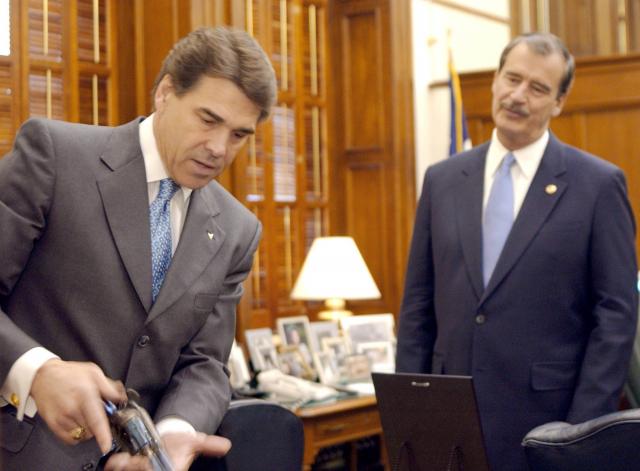In addition, Perry supports the worst kind of diversity, signing a bill that put Texas in the position of policing Islamic dietary laws (see Republicans: Just Say NO to Islamic Sharia Law). Whatever happened to the separation of church, er mosque and state?
York: Will immigration cripple Rick Perry’s bid?, Washington Examiner, Sept 9, 2011
Commentary on the Rick Perry-Mitt Romney showdown at the GOP debate has focused on Perry’s “Ponzi scheme” critique of Social Security. It’s an important issue, and Perry will have to rethink the way he talks about Social Security in coming days. But not enough attention has been paid to Perry’s performance on an issue that could be his undoing in the GOP race: immigration.
The bottom line of Wednesday’s debate is that Perry, governor of a border state for more than a decade, didn’t have much to say about immigration. When asked how he would secure the U.S.-Mexican border, his answer was “boots on the ground” — Border Patrol agents — and more unmanned drone aircraft. That was about all Perry had to say, beyond criticizing President Obama. “For the president of the United States to go to El Paso, Texas, and say that the border is safer than it’s ever been, either he has some of the poorest intel of a president in the history of this country, or he was an abject liar to the American people,” Perry said. “It is not safe on that border.”
But what to do about it? Romney was more prepared for the question. First, he called for a fence along the border. Then, he called for more U.S. agents to secure the fence. And then he called for measures to turn off what he called the “magnet” drawing illegal immigrants to the United States. “Sanctuary cities, giving tuition breaks to the kids of illegal aliens, employers that knowingly hire people who are here illegally — those things also have to be stopped,” Romney said.
Romney seemed clearly ready for a confrontation with Perry over immigration, but the debate moved on, and the moment passed. But there will be a reckoning, and probably soon, because on a number of key immigration issues, Perry’s positions will alienate a significant part of the Republican primary electorate. Romney or some other candidate is sure to take advantage of that.
Start with the border fence. Perry opposes it. “Building a wall on the entire border is a preposterous idea,” he said recently in New Hampshire. “The only thing a wall would possibly accomplish is to help the ladder business.” Perry says he supports some forms of “strategic fencing in certain urban areas,” but that’s all.
Then there are measures to stop employers from hiring illegals. Perry opposes E-verify, which is a program requiring employers to check the legal status of new hires. It has been very effective in stopping the hiring of illegals, but Perry does not support requiring private businesses to use it, and he doesn’t want state agencies in Texas to use it, either. “E-verify would not make a hill of beans’ difference in what’s happening today,” Perry said in a 2010 debate.
Then there is taxpayer-subsidized, in-state tuition for illegal immigrants. Perry signed the Texas Dream Act in 2001 making it the law in Texas. “We must say to every Texas child learning in a Texas classroom, ‘We don’t care where you came from, but where you are going,’” Perry said at the time. “The message is simple: Educacion es el futuro, y si se puede.” Perry still supports the measure.
Finally there is the question of guest workers. “I support a guest worker program that takes undocumented workers off the black market and legitimizes their economic contributions without providing them citizenship status,” Perry said in 2006. “A guest worker program that provides foreign workers with an ID removes the incentive for millions of people to illegally enter our country.” To critics, that’s just amnesty with a different label.
Perry does oppose sanctuary cities, but on the other hand he has been critical of the new Arizona immigration law, which has widespread support in the Republican base.
Immigration was a red-hot issue among Republican voters in 2007 and 2008. It almost killed the candidacy of Sen. John McCain, who had to retreat from his advocacy of comprehensive immigration reform and take up an enforcement-first position. Now, it could be that, given the breadth and depth of today’s economic worries, immigration is a less important issue among Republicans. But reports from the campaign trail suggest it comes up a lot in the candidates’ question-and-answer sessions, and voters mostly want to hear tough positions that are the opposite of Perry’s.
A challenge on immigration is in the offing for Perry. How he handles it could determine the success or failure of his candidacy.
Byron York, The Examiner’s chief political correspondent, can be contacted at [email protected]. His column appears on Tuesday and Friday, and his stories and blogposts appear on ExaminerPolitics.com.













